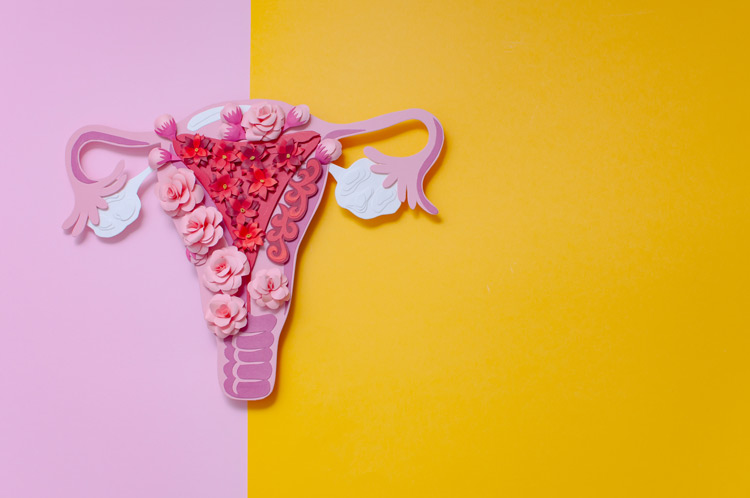
Premenstrual Dysphoric Disorder (PMDD) has been a hot topic in the media recently after 4,000 women shared their experiences of the condition with BBC Research. This revealed just how severely the condition can affect women and highlighted the horror of premature hysterectomy as a solution to the disabling symptoms experienced with PMDD. It is tragic that young women are misled into losing their ovaries and womb, when there are other far less invasive options, like bioidentical HRT (BHRT).
It’s essential that as a society we destigmatise the negative ideas around menstruation. Hormones are essential for all processes in the body and need to be balanced for optimum wellness. Our sex hormones and neurotransmitters work together to create the harmony of a normal menstrual cycle and it’s important to understand what happens when that rhythm is disrupted.
PMDD has been dismissed in popular culture as “the time of the month” and we’ve heard time and time again from our patients that they don’t feel listened to or aren’t taken seriously by their GPs. Women have been dealing with the symptoms of PMDD for as long as they have been menstruating, yet it was only last year that the World Health Organization (WHO) recognised PMDD as a real condition. This is a significant step in the right direction. PMDD is now categorised as a depressive disorder with a recognised prevalence ranging from 3% to 5% among women who menstruate.
As PMDD is now globally recognised as a medical condition requiring treatment, we hope this means that physicians and workplaces will take it more seriously, and that women who experience symptoms will not only feel validated but be able to get a clear diagnosis and effective treatment that doesn’t take away their womanhood.
What Is Premenstrual Dysphoric Disorder (PMDD)?
PMDD is a severe form of PMS (premenstrual syndrome) which can cause a myriad of emotional and physical symptoms each month during the week or two before your period starts. Most women will experience recurrent mild symptoms of PMS but with PMDD, the symptoms are intense and seriously impact on one’s ability to function. At the Marion Gluck Clinic, we’ve been treating women with PMDD for the last 25 years, and fully understand just how much of an impact this condition can have on quality of life. It’s not uncommon for women to feel suicidal.
Dr Ghazala Aziz-Scott, Doctor at the Marion Gluck Clinic, comments: “Unfortunately, many doctors have a limited understanding of PMDD and women remain embarrassed to acknowledge their symptoms. It can be misdiagnosed as anxiety, depression or a personality disorder and doctors can fail to spot the cyclical link, especially if symptoms start at ovulation and don’t stop until the end of the period.”
“In the last week, I have seen patients with bipolar disorder and generalised anxiety disorder consult me for help with probable PMDD. One of the problems is that PMDD can co-exist with a number of psychiatric conditions as these illnesses make women more vulnerable to the hormonal changes of the menstrual cycle.
Additionally, a number of psychiatric and physical disorders are exacerbated premenstrually such as IBS, migraines, depression and anxiety and this is known as menstrual magnification. If we manage the underlying condition, the premenstrual flare often diminishes. As symptoms are intermittent, many women don’t realise they are treatable. However, if we have insight into the cause of PMDD, we can then aim to find the right solution.” explains Dr Aziz-Scott.
Symptoms Of PMDD
Symptoms of PMDD are both cyclical and chronic, improving once the period starts. Hormonal life events such as pregnancy, childbirth, perimenopause and postpartum depression can be triggered due to rapid hormonal fluctuations.
In order to be diagnosed with PMDD a patient must have at least 5 out of 11 specific symptoms that occur during the week before menstruation and improve within a few days after onset of the period, for at least 2 menstrual cycles. These symptoms include:
- Mood swings
- Irritability and anger
- Anxiety and feelings of tension
- Depression and a lack of interest in daily activities and relationships
- Fatigue
- Suicidal thoughts
- Physical symptoms such as breast tenderness, aching muscles and joints, bloating, headaches
- Feeling out of control
- Lack of concentration or trouble thinking
- Food cravings/binge eating
- Insomnia or hypersomnia

Causes Of PMDD
The underlying cause of PMDD is complex and cannot be boiled down to a single individual factor. There are, however, five major areas that are thought to contribute to it:
1. Genetic susceptibility.
There is a genetic link to being sensitive to hormonal changes. The estrogen receptor alpha gene, which is important for emotional arousal, has a variation that can be found in PMDD.
2. Low levels of progesterone and its metabolite allopregnanolone (Allo).
Sex hormones and neurotransmitters linked to mood share common pathways in the brain. High levels of the sex hormone progesterone in the second half of the menstrual cycle are reflected by high Allo levels, and Allo modulates GABA receptors in the brain. GABA is the brain’s off switch and primary regulator of mood. Allo therefore has sedative and anxiety-reducing properties similar to the action of alcohol and tranquilliser medications. PMDD sufferers appear to have a disturbance of GABA receptor function and GABA levels are also altered. SSRI medication is helpful in treating PMDD as it enhances sensitivity of GABA receptors and promotes formation of more Allo. Pregnancy, progesterone supplementation and high luteal peaks cause high Allo and so progesterone is often called the “Happy Hormone”.
3. Low estrogen and serotonin levels.
Estrogen affects multiple neurotransmitter systems which regulate mood, cognition, sleep, and eating. PMDD patients can have low estrogen levels in the luteal phase of their cycle, which decreases serotonin (another hormone that makes us feel happy) and PMDD sufferers are extra sensitive to estrogen and progesterone fluctuations.
4. Structural and functional differences in the brain.
Patients with PMDD typically have differences in a part of the brain called the amygdala, which has a key role in emotional regulation and behaviour. It is also known as the “fear centre” and PMDD sufferers have a heightened stress response. There are also changes in the prefrontal cortex which executes complex cognitive functions.
5. The hypothalamic pituitary axis.
The hypothalamic pituitary axis is a major information highway for communication between our hormones and is also our central stress response system. Prolonged stress or trauma such as PTSD or sexual abuse changes this response so we have less resilience to adapt to stress.
“I frequently see the links between adverse childhood events such as adoption, early loss of a parent, and various types of relational abuse (emotional, physical and sexual) with presentations of PMDD in adult life.” says Dr Aziz-Scott.
PMDD Treatments & Hormone Balancing For PMDD
As the cause of PMDD is so complex, a comprehensive evaluation of the patient is essential by an experienced doctor with an understanding of both mental health and hormonal imbalance.
Our approach at the Marion Gluck Clinic is to thoroughly evaluate each patient and uncover the root cause of the condition, the reasons for hormone imbalance such as estrogen dominance and HPA axis dysregulation. The impact on the patient’s life and pre-existing psychiatric conditions are both taken into account. We take a holistic approach and also look at lifestyle factors such as diet and exercise, life stressors, past events and gut health in order to formulate a treatment plan that supports the patient.
Conventional treatments for PMDD include:
- SSRI medication, which increases serotonin levels. This is an effective treatment for the mood swings of PMDD and can work within hours or days.
- Combined oral contraceptive pill, which switches off ovulation and therefore decreases sex hormone production. The downside is that the progesterone in the pill is synthetic, which can have side effects.
- GnRH analogues, which inhibit the follicle-stimulating hormone (FSH) and luteinising hormone (LH) that orchestrate the whole menstrual cycle so that ovulation is totally absent and this reduces hormonal fluctuation.
- Hysterectomy, which is a radical treatment and has a brutal effect on the long-term physical and psychological wellbeing of young women.
Alternative treatments for PMDD:
- High doses of bioidentical progesterone can relieve PMDD. Bioidentical progesterone is one of the mainstays of treatment at the Marion Gluck Clinic and can be used in conjunction with other treatments.
- Magnesium and Vitamin B6 calm the nervous system and so help stabilise mood.
- Herbal remedies such as Agnus Castus or chasteberry can relieve symptoms of mood swings, irritability and mood swings.
Get Help For PMDD
If you have PMDD, or suspect you are showing symptoms of PMDD, know that you are not alone. Help is available to you. At the Marion Gluck Clinic our doctors are compassionate and experienced at treating patients with PMDD using bioidentical hormone balancing therapy, which is non-invasive and can be truly life-changing.
Where helpful we can also signpost patients to peer support groups and specialist organisations such as the National Association for Premenstrual Syndrome. We also support emotional wellbeing and recommend stress management and talking therapies.
To arrange a telephone or video consultation with one of our doctors, please contact our Patient Care Team.



